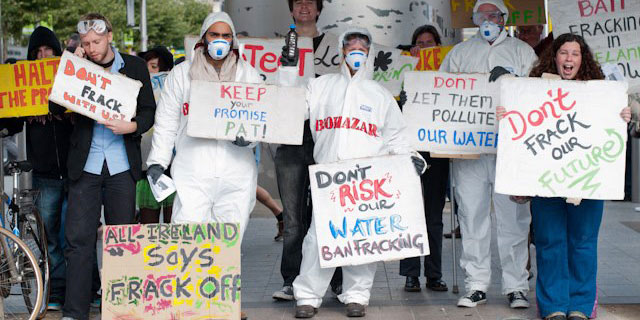Written by Jamie Gorman, Young Friends of the Earth Ireland
One blustery, sunny Sunday morning last November, I took a walk with a local person in a community threatened by fracking. Walking along winding country roads, over hilltops and past gushing brooks, she shared with me a little of the rich history and folklore through which we traipsed. We passed ruined cottages whose former inhabitants still occupy the memory of the place and ancient forestswhich the fairies, mythical creatures of Irish folklore, are said to still inhabit.
This sense of folklore, culture and history is very important. In a very real sense the land does not belong to the people- the people belong to the land on which their families have lived for generations. This is why they are fighting against fracking and all forms of unconventional gas extraction which will destroy the environment and tear apart communities.
If fracking takes place then the fairy stories of this beautiful countryside will be replaced by the nightmare of irreversible human health and environmental damage.
Fracking is a process where water, sand and toxic chemicals are injected into the earth at high pressure. The aim of this process is to fracture rock formations deep underground to release shale gas that would otherwise be inaccessible.
A report by the European Parliament has noted that fracking causes ‘groundwater contamination by methane, in extreme cases leading to explosion of residential buildings, and potassium-chloride leading to salinisation of drinking water is reported in the vicinity of gas wells.’
In Ireland the proposed fracking sites are in areas well-connected to our water table and river network. Ireland and Northern Ireland’s largest rivers, the Shannon and the Erne, flow through the areas which fracking is proposed.
The EU report also highlights ‘unavoidable’ high land occupation that fracking requires. The landscape is taken over by drilling pads, parking and manoeuvring areas for trucks, equipment, gas processing and transporting facilities and access roads.
Fracking will result in a land grab (or ‘compulsory purchase’) as it takes over the landscape that is home to thousands of families in hundreds of communities. Many of these communities are sustained by farming and eco-tourism – the two sectors most threatened by fracking.
As a grassroots network of young people, Young Friends of the Earth Ireland, is mobilising in solidarity with communities across Ireland to oppose fracking. YFoE Ireland held its recent network gathering on the shores of Lough Allen in fracking-threatened County Leitrim. At the gathering we learned more about how fracking will destroy the countryside from Leah Doherty of No Fracking Ireland, campaigner Dr Aedin McLoughlin of the Good Energies Alliance Ireland, and Chairperson of the Leitrim Organic Famers’ Association, Tommy Earley.
Saturday 22 September was Global Frackdown day. YFoE Ireland held actions in Dublin, Cork and Galway to send a clear message to the Irish government that young people do not want their futures destroyed by fracking. Future generations of Irish people must be able to enjoy our beautiful landscape and rich heritage. They might even manage to catch a fairy, as long as they haven’t been fracked!
Follow Young Friends of the Earth Ireland as they continue to resist fracking in Ireland www.youngfoe.ie

